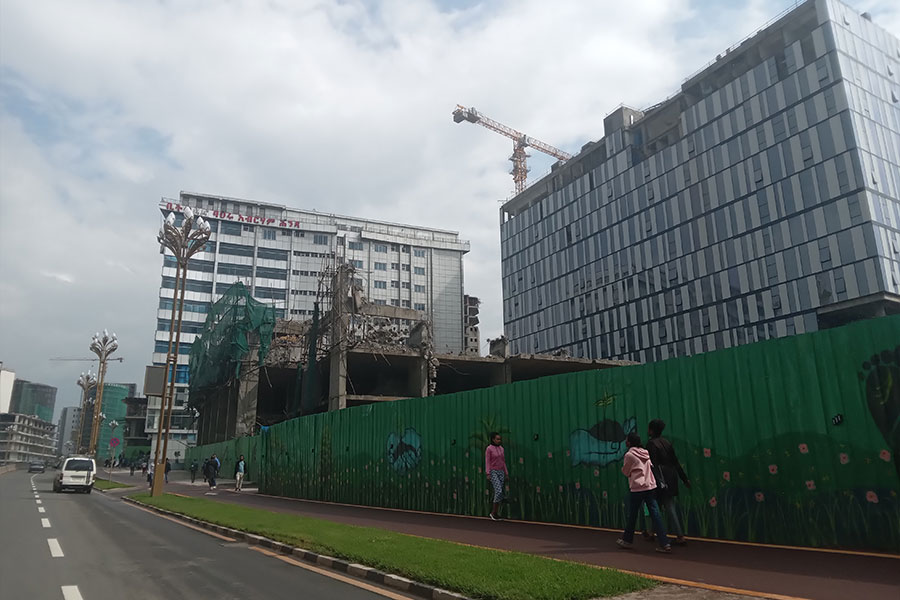
In-Picture | Sep 29,2024
A former teacher, Tesfaye, has lost two out of his three shops during a fire breakout last week. His sister was managing one of the shops while their family’s livelihood depended on it. He had seen the extent of the damage four days later and did not process it fully.
“I don’t think I’m sane,” he told Fortune.
Tesfaye, in his late 30s, is in shock. He carried a bunch of onions in a black plastic bag as he waited for the shareholders of the damaged building to start a meeting. It took too long and Tesfaye could not bear to stay for another minute.
“I better go home and chop up my onion,” he said while walking out of the hall.
Merkato, the largest open market in Addis Abeba, endured a devastating fire last week that ravaged 550 small shops and damaged two prominent buildings in the Shema Tera area, renowned for traditional clothing production. The fire inflicted considerable harm on the Nebar Trade Center from its third to fifth floors, while the Shema Tera Trade Center underwent relatively minor damage, leaving much of the area in disarray.
The pungent odour of burnt plastic and garbage filled the air even days after the blaze. Half-burnt traditional clothes lay scattered about as city authorities commenced clearing the charred debris. Metal remnants that survived the inferno were auctioned off to a bidder who paid 850,000 Br, while local officials assessed the damage, a task of immense proportions given the fire’s extent.
The fire broke out on Monday, October 21, 2024, at dusk, quickly intensifying and raging for over 24 hours. Though the main blaze was extinguished, residual smoke and occasional sparks lingered until four days later.
Another trader was Abdulwehab Shamil, who has run a traditional clothing business for the past 20 years. He has lost half a million Birr.
His shop, inherited from his father who had crafted traditional garments, was entirely gutted. Six employees relied on the shop for their livelihood, as did his family.
"Our life depended on this business," he said, visibly disheartened by the immense loss.
The loss is not only financial but also emotional, as their connection to Merkato stretches back decades.
Another long-time trader, Werku Woldemedhin, lost two shops housed in the Nebar Trade Center: a shoe warehouse and a children’s clothing store.
"It held nearly one million Birr in materials," he said.
The scale of the disaster prompted a response from local authorities. Aida Awel, head of the Addis Ketema District, remarked that the fire department’s collaboration with various stakeholders was instrumental in containing the fire.
"It could have spread far beyond its initial impact," she noted, adding that the densely packed shops posed considerable risk.
It took hours. But the city’s fire department managed to control the blaze despite logistical hurdles. The incident spotlighted the difficulties of emergency response in densely populated urban settings. The Commissioner said that they struggled to reach all corners due to narrow alleys and obstructed pathways.
One of the damaged building Nebar Trade Center housed over 700 shops and counted more than 200 shareholders.
Abebaw Tefera, a board member of the share company, disclosed that over half the building's façade was impacted by the flames, estimating the structure’s value at more than 500 million Br. For the community reliant on the building, the destruction represents an immense setback, both economically and socially.
The fire's origin has fueled widespread speculation among stakeholders and witnesses. Mubarak Kamil, board chairperson of the Nebar Trade Center, said that the fire began amidst a cluster of small shops, later spreading to the larger building. According to him, the crowded environment, coupled with limited access roads, severely hampered the fire department's efforts.
"It could have been far worse," he said, pointing to the highly flammable materials stored throughout the area.
Efforts to restore normalcy are underway, albeit slowly. On October 26, board members of the Nebar Trade Center regained control of their building from the Federal Police. Mubarak outlined the board’s immediate priority.
"Returning to our previous status is essential,” he said. “We need to rebuild not only our livelihoods but also the market's spirit."
Officials met with shop owners, pledging to support recovery efforts. Habiba Siraj, head of the Addis Abeba Trade Bureau, stated that they are exploring options to help traders reestablish their businesses.
The incident has reignited conversations around disaster preparedness, especially in urban markets where fire risks remain high. Fikre Gizaw, commissioner of the Addis Abeba Fire & Disaster Risk Management Commission, noted the need for construction regulations to incorporate disaster prevention measures, such as ensuring safe surroundings and managing flammable materials.
He said another issue was posed by onlookers who, in their attempts to assist, complicated the efforts of the fire department.
"When community members rush into the flames, it often causes more harm and disrupts our work," he noted.
Fikre's interview with state media underscored the deficiencies in safety awareness and the inadequacy of fire control infrastructure. In a city rapidly urbanising like Addis Abeba, proper fire prevention measures in commercial buildings remain sporadic, with little oversight. The Commissioner called for rigorous enforcement, insisting that the agency overseeing construction should directly verify the presence of fire control infrastructure.
Around 523 fire incidents were recorded across Addis Abeba last year. Through emergency interventions, the Commission saved 156 lives and prevented material losses totalling 35 billion Br. Despite these efforts, gaps in disaster readiness remain.
Mayor Adanech Abebie acknowledged the infrastructure barriers that slowed the fire department's response, particularly the lack of adequate road access for emergency vehicles. She revealed that the city administration has been exploring options to secure a helicopter for aerial fire control, which could greatly enhance response capabilities in congested areas like Merkato. The Addis Abeba City Police, meanwhile, reported that the fire's cause is under investigation. They also disclosed the capture of 33 suspects implicated in thefts during the fire, along with reports of two severe injuries and seven minor injuries sustained in the chaos.
For the neighbourhood surrounding Nebar Trade Center, the incident was a sombre reminder of persistent bureaucratic delays. Gossaye Gura, head of Merkato Meserete Lemat S.C., voiced frustration over a stalled construction project intended to improve the market’s infrastructure. Since 2010, the share company had plans to build a large shopping mall, which would span 2,500Sqm with a half-a-billion Birr budget.
Bureaucratic red tape, however, has stymied progress.
"This tragedy might have been averted had our building project been completed on time," he said, lamenting the financial setbacks shareholders now face.
A total of 318 shops under the share company were destroyed in the blaze. He noted that only a few owners managed to salvage their belongings, while fire department arrived promptly but was hindered by access issues.
"We lost far more than we should have," he said.
The fire's aftermath has led to renewed scrutiny of building standards in Merkato. Addis Ketema District currently has 182 companies with approved building proposals, 77 of which are share companies. Of these, 10 received approval last year, with another 33 proposals under review. Some companies, according to Yidnekachew Girma, head of the District Trade Bureau, have been waiting over two decades for permits, an administrative bottleneck that leaves buildings vulnerable.
Merkato is not just an economic centre but a hub of entrepreneurial ambition for rural migrants hoping to make their way to the capital. It is estimated that over 7,100 businesses are housed and more than 200,000 people engage daily, contributing a quarter of Addis Abeba’s annual revenue. Shema Tera, the area affected, is particularly a hub for footwear-related businesses, with many engaged in both production and trade.
Fitsum Teklemichael, an occupational health and safety expert, stressed that buildings should be outfitted with emergency water lines for incidents like this while training for first responders is equally crucial. Fitsum’s recent survey of building fire readiness in Addis Abeba revealed that none of the security personnel were adequately trained in using fire extinguishers, an oversight with dire consequences in such emergencies. Fire safety systems like alarms, detectors, and sprinklers are vital, according to him, but they require annual inspections and tri-annual functional testing to ensure effectiveness.
In Merkato, however, many small trade establishments lack even basic safety features, with electrical systems often installed by non-professionals and frequently overloaded. The absence of dedicated fire hydrant lanes has only intensified challenges, adding to response times.
For future prevention, Fitsum urged building owners to acquire fire extinguishers and incorporate safety systems, noting that simple investments in safety could mitigate substantial risks.
"The first three minutes of a fire are critical," he noted. "If it isn't contained immediately, larger-scale responses are necessary."
Insurance, usually overlooked in Merkato, has proven essential. Assegid Gebremedhin, an insurance consultant, noted that the congestion and flammable materials in Shema Tera pose severe risks, compounded by a lack of building standards. Small shops, operating under substandard conditions, often cannot secure insurance.
The Nebar Trade Center, however, was insured by Oromia Insurance, allowing shareholders to claim compensation. Assegid noted that fire and lightning coverage accounts for less than three percent of Ethiopia’s insurance market, with penetration rates below one percent.
"Insurance awareness remains exceptionally low," he said.
While insurance may provide a temporary buffer for affected merchants, Assegid noted the need for a more robust approach to fire risk management in heavily trafficked areas like Merkato.
PUBLISHED ON
Oct 27,2024 [ VOL
25 , NO
1278]

In-Picture | Sep 29,2024
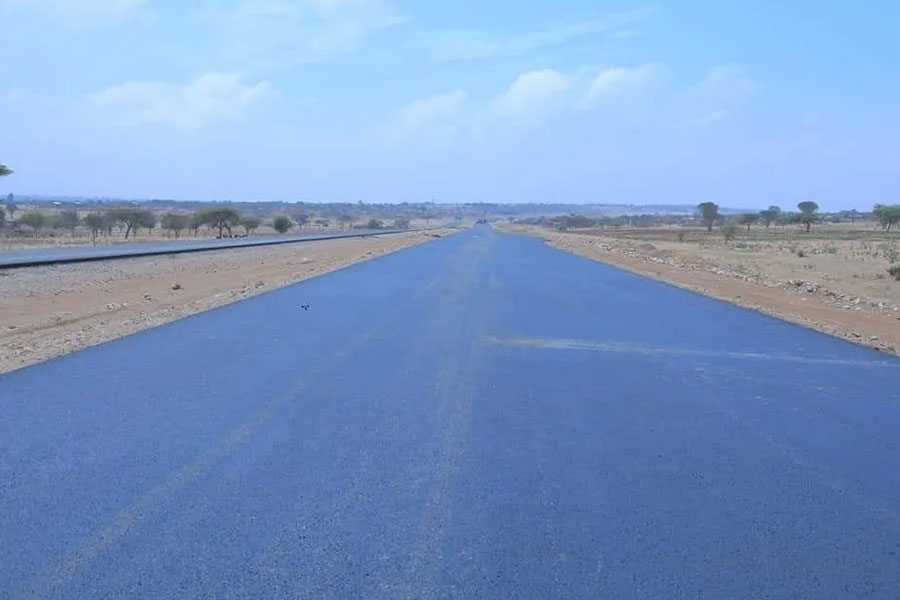
Fortune News | Jul 17,2022
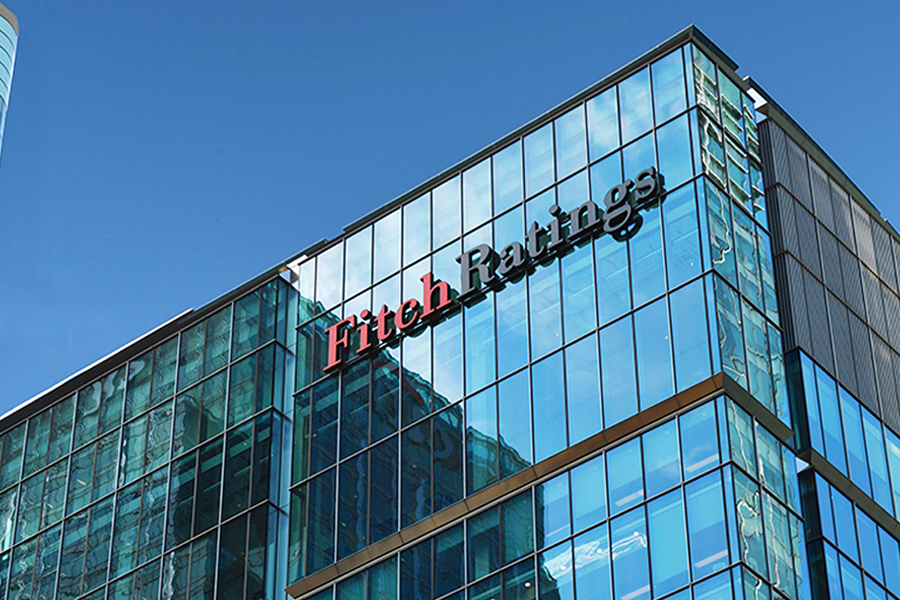
Radar | Nov 03,2024

Radar | Jul 13,2025
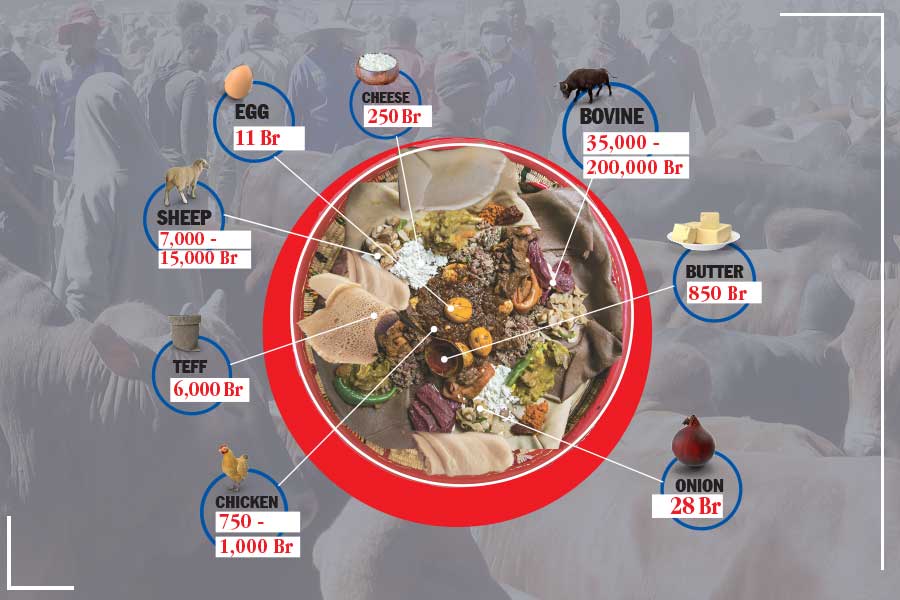
Fortune News | Jan 07,2023

Fortune News | Apr 28,2024

Commentaries | Jul 12,2025
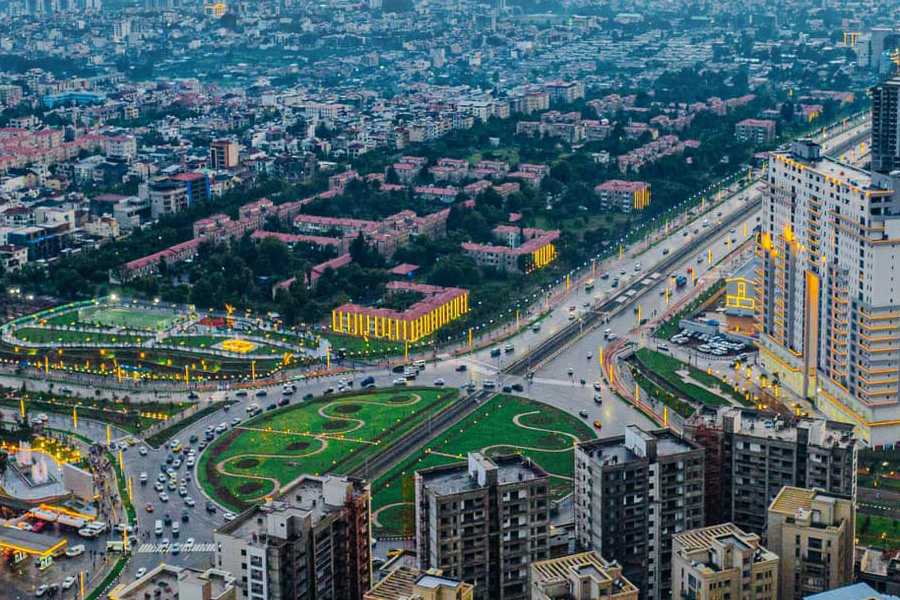
View From Arada | Nov 23,2024
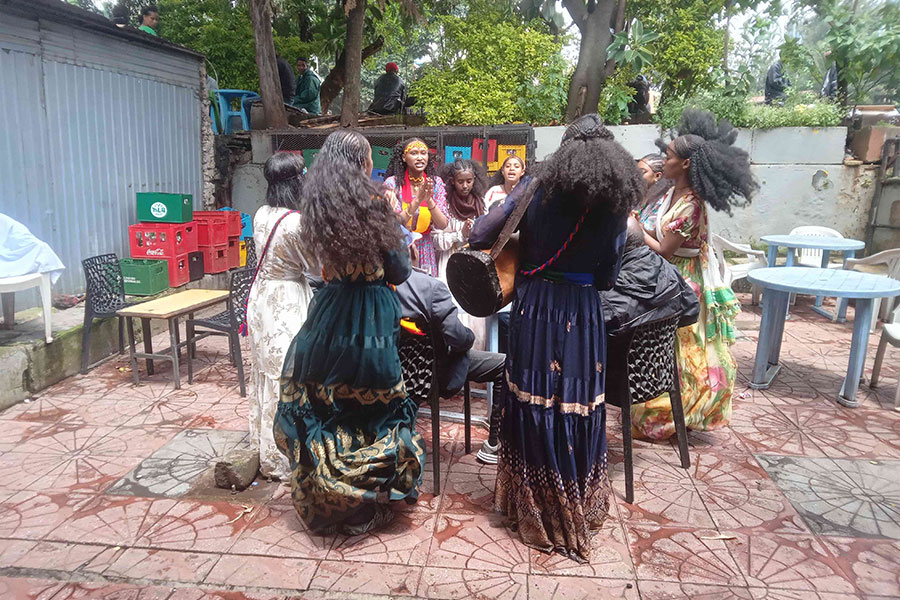
Featured | Aug 23,2025

Radar | Dec 05,2020

Dec 22 , 2024 . By TIZITA SHEWAFERAW
Charged with transforming colossal state-owned enterprises into modern and competitiv...

Aug 18 , 2024 . By AKSAH ITALO
Although predictable Yonas Zerihun's job in the ride-hailing service is not immune to...

Jul 28 , 2024 . By TIZITA SHEWAFERAW
Unhabitual, perhaps too many, Samuel Gebreyohannes, 38, used to occasionally enjoy a couple of beers at breakfast. However, he recently swit...

Jul 13 , 2024 . By AKSAH ITALO
Investors who rely on tractors, trucks, and field vehicles for commuting, transporting commodities, and f...

Oct 18 , 2025
The political establishment, notably the ruling party and its top brass, has become p...

Oct 11 , 2025
Ladislas Farago, a roving Associated Press (AP) correspondent, arrived in Ethiopia in...

Oct 4 , 2025
Eyob Tekalegn (PhD) had been in the Governor's chair for only weeks when, on Septembe...

Sep 27 , 2025
Four years into an experiment with “shock therapy” in education, the national moo...